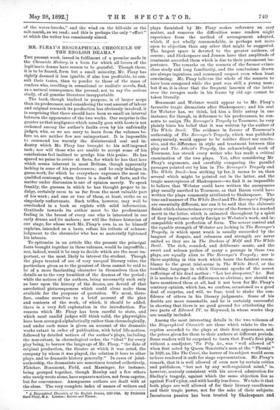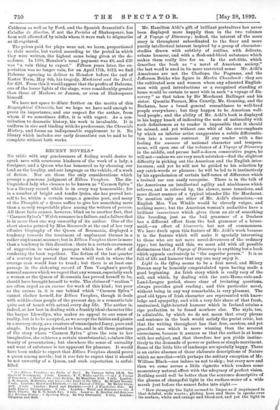MR. FLEAY'S BIOGRAPHICAL CHRONICLE OF THE ENGLISH DRAMA.*
THE present work, issued in fulfilment of a promise made in the Chronicle History, is a boon for which all lovers of the legitimate drama have reason to be grateful. Though these, it is to be feared, form but a small minority, Mr. Fleay has rightly deemed it less ignoble, if also less profitable, to con- sult their tastes, than to pander to those of the mass of readers who, revelling in sensational or realistic novels, find, as a natural consequence, the perusal, not to say the serious study, of all genuine literature insupportable.
The book, though kindred in purpose, is of larger scope than its predecessor, and considering the vast amount of labour and original research its production has obviously involved, it is surprising that there should have been so small an interval between the appearance of the two works. Our surprise is the greater as that negligence which usually goes with haste is not reckoned among the author's faults even by his unfriendly judges, who, as we are sorry to learn from the volumes be- fore us, are neither few nor unimportant. It is impossible to commend too warmly the disinterested zeal and in- dustry which Mr. Fleay has- brought to his self-imposed task; nor will those who are unable to accept some of his conclusions feel inclined to grudge him this praise. He has spared no pains to arrive at facts, for which he has that love which seems inherent in most Britons, though apparently lacking in some of his predecessors ; and he only indulges in guess-work, for which he everywhere expresses the most un- qualified contempt, when there is a dearth of facts, and the matter under discussion is one of opinion merely. To speak frankly, the guesses in which he has thought proper to in- dulge, certainly seem to us far from the most valuable part of his work ; and one or two of them, at least, strike us as singularly unfortunate. Such trifles, however, may well be overlooked in a book so replete with solid information. Gratitude towards its author must be the predominant feeling in the breast of every one who is interested in our early drama and its makers ; nor will the future historian of our stage, for whose work Mr. Fleay's own is, as he himself explains, intended as a basis, refuse his tribute of acknow- ledgment to the chronicler who has so materially lightened his labours.
To epitomise in an article like the present the principal facts brought together in these volumes, would be imposgrible ; nor, indeed, would it be easy to decide which are the most im- portant, or the most likely to interest the student. Though the plays treated of are of very unequal literary value, the particulars given as to the greatest of them cannot be said to be of a more fascinating character in themselves than the details as to the very humblest of the dramas of the period ; while the notices of the authors, being necessarily such only as bear upon the history of the drama, are devoid of that anecdotical picturesqueness which could alone make them available for the purposes of quotation. We must, there- fore, confine ourselves to a brief account of the plan and contents of the work, of which, it should be added, there is a very full explanation in the introduction. For reasons which Mr. Fleay has been careful to state, and which most candid judges will think valid, the playwrights have been arranged alphabetically rather than chronologically, and under each name is given an account of the dramatic works extant in order of publication, with brief life-notices, followed by detailed notices of the author's plays, including the non-extant, in chronological order, the "ideal" for every play being, to borrow the language of Mr. Fleay, "the date of original production, the theatre at which it was acted, the company by whom it was played, the relation it bore to other plays, and to dramatic history generally." In cases of joint- authorship, the dramatists are sometimes treated collectively, Fletcher, Beaumont, Field, and Massinger, for instance, being grouped together, though Rowley and a few others who rarely wrote alone, have separate notices, not from caprice, but for convenience. Anonymous authors are dealt with at the close. The very complete index of names of writers and
* A Biographical Chronicle of the English Drama, 1669-1648. By Frederick Gard Fleay, M.A. London : Reeves and Turner,
plays furnished by Mr. Fleay makes reference an easy matter, and removes the difficulties some readers might experience from the method of arrangement adopted, which, if not wholly commendable, is perhaps not more open to objection than any other that might be suggested. The largest space is devoted to the greater authors, of course ; and Shakespeare and Jonson have that amplitude of treatment accorded them which is due to their paramount im- portance. The remarks on the sonnets of the former evince close study and long familiarity, and the conclusions drawn are always ingenious, and command respect even when least convincing. Mr. Fleay believes the whole of the sonnets to have been composed while the poet was still a young man ; but if so, it is clear that the frequent laments of the latter over the ravages made in his frame by old age cannot be taken literally.
Beaumont and Webster would appear to be Mr. Fleay's favourite tragic dramatists after Shakespeare ; and his zeal for Webster has, we think, led him a little astray in one instance, for though, in deference to his predecessors, he con- sents to assign The Revenger's Tragedy to Tourneur, he very plainly hints his belief that it was written by the author of The White Devil. The evidence in favour of Tourneur's authorship of The Revenger's Tragedy, which was published anonymously, would appear to be neither direct nor conclu- sive, and the difference in style and treatment between this- play and The Atheist's Tragedy, the acknowledged work of Tourneur, has struck every writer who has made a critical examination of the two plays. Yet, after considering Mr Fleay's arguments, and carefully comparing the parallel passages pointed out by him in The .Revenger's Tragedy and The White Devil—less striking by far, it seems to us, than several which might be pointed out in the latter, and the tragic masterpieces of Shakespeare—we find it as impossible to believe that Webster could have written the anonymous play usually ascribed to Tourneur, as that Bacon could have written the plays commonly attributed to Shakespeare. The tone and manner of The White Devil and The Revenger's Tragedy are essentially different, nor can it be said that the elaborate finish which characterises every scene of the former is a marked merit in the latter, which is animated throughout by a spirit of fiery impatience utterly foreign to Webster's work, and in- compatible with perfection of form. The severe control and the equable strength of Webster are lacking in The .Revenger's Tragedy, in which spent wrath is usually succeeded by the languor of despair, and calmness and strength are never united as they are in The Duchess of Malfi and The White Devil. The rich, rounded, and deliberate music, and the sweet and solemn pathos of many a passage in these two plays, are equally alien to The Revenger's Tragedy ; nor is there anything in this work which bears the faintest resem- blance to the great trial-scene in The White Devil, or the touching language in which Giovanni speaks of the secret sufferings of his dead mother : "Let her sleep ever," &c. But it is useless to dwell on differences so obvious ; nor should we have mentioned them at all, had it not been for Mr. Fleay's contrary opinion, which has, we confess, occasioned us a good deal of surprise, and will, we fear, tend to shake the con- fidence of others in his literary judgments. Some of his doubts are more reasonable, and he is certainly successful in showing that there is no good ground for attributing the two parts of Edward IV. to Heywood, in whose works they are usually included.
Among the most interesting details in the two volumes of the Biographical Chronicle are those which relate to the re- ception accorded to the playa at their first appearance, and the prices given for them to their authors at different periods. Some readers will be surprised to learn that Ford's first play without a coadjutor, 'Tie Pity, &c., was "well allowed of" when first acted by Queen Henrietta's men at the " Phcenix" in 1626, as, like The Cenci, the horror of its subject would seem to have rendered it unfit for stage representation. Mr. Fleay's remark, that it is well allowed of even now by certain critics and publishers, "but not by any well-regulated mind," is, however, scarcely consistent with his avowed admiration for Shelley's tragedy, against which the same objection lies as against Ford's play, and with hardly less force. We take it that both plays are well allowed of for their literary excellences and their tragic power, not for the sake of their subjects. Incestuous passion has been treated by Shakeapeare and
Calderon as well as by Ford, and the Spanish dramatist's Los Cabellos de Absalon, if not the Pericles of Shakespeare, has been well allowed of by minds whom it were rash to stigmatise as ill-regulated.
The prices paid for plays were not, we learn, proportioned to their merits, but varied according to the period in which they were written, the highest sums being given at the de- cadence. In 1598, Henslow's usual payment was 26, and 220 was "a vain thing to expect." Fifteen years later, the ex- pectation was no longer vain, for on April 17th, 1613, we find Daborne agreeing to deliver to Henslow before the end of Easter Term, May 8th, his tragedy, Machiavel and the Devil, for 220. From this it would appear that the profits of Daborne, one of the lesser lights of the stage, were considerably greater than those of Marlowe or Jonson, or even of Shakespeare himself.
We have not space to dilate further on the merits of this Biographical Chronicle, but we hope we have said enough to prove its importance, and our respect for the author, from whom if we sometimes differ, it is with regret. As a con- tribution to dramatic history, his work is invaluable. It is uniform in size and binding with its predecessor, the Chronicle History, and forms an indispensable supplement to it. No library which includes our early dramatists can be said to be complete without both works.







































 Previous page
Previous page